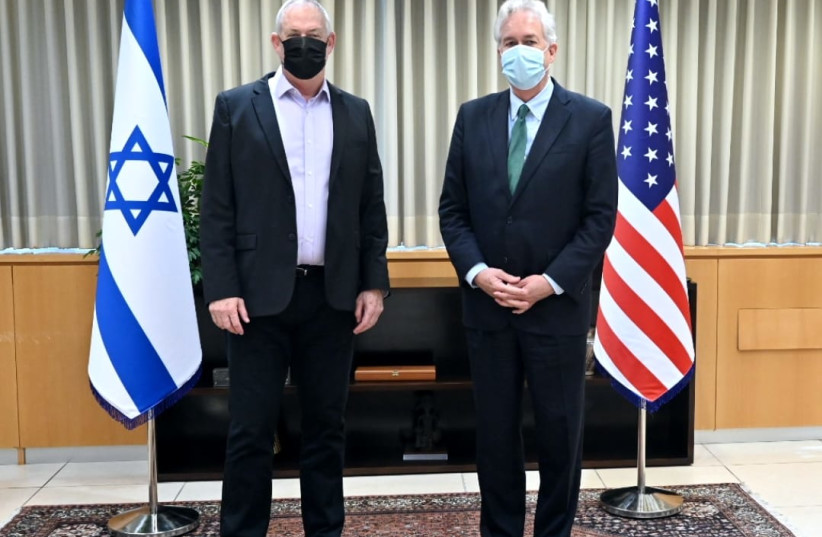DIPLOMACY – Prime Minister Naftali Bennett arrived in Washington with a catchphrase he used at every opportunity: “A new spirit of cooperation and goodwill.”
It’s meant to describe his government, which is made up of parties of very different political ideologies working together on the areas in which they agree, and Bennett said he hopes it will characterize the relationship between the US and Israel under their new leaders.
The elephant in the room and, to mix metaphors, the glue holding both his coalition and himself and US President Joe Biden together, is opposition leader Benjamin Netanyahu. Neither the coalition partners nor Biden want Bibi back in the Prime Minister’s Office, so they’re willing to accept a lot of things they normally wouldn’t to keep Bennett afloat.
Bennett, with his “new spirit of cooperation” and eagerness to show he has international chops, is easier for Biden to work with than Netanyahu was.
Biden wants quiet on the Israeli front, politically and militarily, not just out of a desire to see an American ally live peacefully, but so he doesn’t have to think about Israel too much with everything else going on. That is the sense some senior Israeli officials had.
Israel was never the top item on Biden’s to-do list. He came into office with a primarily domestic agenda, and his international priorities were elsewhere.
Bennett arrived in Washington in a week when, it would seem, Israel was bumped even lower down the list because of the unfolding crisis in Afghanistan – and he knows it. But he and his advisers hoped that Biden would relish the opportunity to inject something positive into the news cycle, with a friendly visit. That went haywire when, only an hour before the scheduled time for the meeting, suicide bombers killed and injured dozens, including Americans, in Kabul.
That, of course, puts a damper on the entire atmosphere of the Bennett-Biden meeting, which was meant to be a warm and friendly getting-to-know-you event.
The feeling in Jerusalem ahead of the trip was that the Biden administration supports Israel, but would rather not have to deal with Israel’s problems, whether with the Iranian threat – the administration wants to put Iran “back in the box” of the 2015 nuclear deal and then forget about it – or the related violence from Gaza, on which it backs Israel but is wary of pressure from leftist members of Congress. A terrorist attack in another part of the world, moments before the leaders’ big meeting, delaying it by hours, only amplifies that.
The Biden administration presents things differently.
“The end of America’s military involvement in Afghanistan frees up resources and attention and ultimately allows us to better support our partners like Israel,” a senior administration official said ahead of the Bennett-Biden meeting this week.
It should be noted that the trip was announced after the Afghanistan crisis began. The administration could have discretely postponed the meeting with Bennett, if it thought it wouldn’t have the bandwidth to deal with Israel this week. Instead, it went out of its way to warmly welcome him.
Plus, Biden has said many times that he is a Zionist, and few countries have been graced by the visits of as many senior US officials – like Secretary of State Antony Blinken, Secretary of Defense Lloyd Austin and CIA Director Bill Burns – as Israel in the months since they entered office.

But the official also made it clear they’re not looking to rock the boat: “If anything, in the Biden administration, we are not pursuing unachievable goals. We’re not trying to transform the Middle East. We’re not trying to overthrow regimes. We are pursuing a very steady course, centered on achievable aims.”
ON THE one hand, this is good news for Bennett, who made clear right before the trip that his diverse governing coalition will neither pursue the establishment of a Palestinian state – which he opposes – nor annexation of Judea and Samaria. It will neither freeze settlement construction nor announce massive building projects. The Biden administration has said that, while it supports a two-state solution, it’s not likely to happen anytime soon, which means that there is less pressure on Bennett.
Instead, Jerusalem and Washington agree on what the senior administration official called “steps that can be taken to kind of dampen the risks of further sparks to conflict,” or as Bennett has said, economic projects to improve the Palestinians’ quality of life.
It’s good news when it comes to other controversies, as well. While no one is talking about it publicly, the Biden administration’s pursuit of a consulate to the Palestinians in Jerusalem has been put on hold indefinitely. Bennett opposes the opening of a consulate to a foreign entity on Israeli sovereign land, and told The New York Times this week: “Jerusalem is the capital of Israel. It’s not the capital of other nations.”
The Biden administration has not pushed Bennett’s government on the issue and is unlikely to do so at least until after the November deadline for the Knesset to pass a budget, which would greatly stabilize the Israeli government.
These are what a source in Bennett’s entourage on the trip called “soft disagreements.” Each side knows where the other stands. They know they won’t reach an agreement, so they’re just living with the disagreement for now.

Encouraging normalization between Israel and Arab states is also a policy that the Biden administration could continue in the vein of a “steady course... achievable aims.” It’s true that the Abraham Accords were a revolutionary step last year, but now the Biden administration is committed to staying the course, at least at the level of maintaining the ties established with Israel.
The senior administration official said that “behind the scenes, there’s an awful lot of work going on to expand those arrangements to other countries,” though some in Jerusalem would like to see more of that work.
And Bennett’s push for $1 billion to replenish the Iron Dome missile defense system’s batteries is his version of “achievable aims.” The Biden administration already promised it, and when Congress approves the funds, both sides can present it as a win.
BUT THE Biden administration’s aversion to rocking the boat may not serve Bennett as well when it comes to Iran.
Bennett showed up in Washington as the man with a plan. He did an in-depth policy review and has concrete solutions for different scenarios. He thinks the cost of rejoining the nuclear deal, meaning lifting sanctions and giving Iran an economic boost, when Iran is currently enriching uranium up to 60%, outweighs the benefits by far, since the whole point of the agreement is to drastically limit enrichment.
And Israeli diplomatic sources say the Biden administration realizes that, at this point, the chances of Iran returning to the 2015 agreement are slim. Tehran left the indirect talks with the US over two months ago, and the new president in Iran is far more anti-Western than his predecessor.
The Biden administration, however, is still publicly committed to putting Iran “back in the box” of the Iran deal, as rickety as that box may be these days. The senior administration official said it is “committed to the diplomatic path. We think that is the best way to put a ceiling on the program and roll back the gains that Iran has made over recent years on the nuclear side.”
That being said, Bennett knows to whom he is talking and he knows where the Americans stand. His solutions are gradual. He’s not looking to start a war, but he’s looking for a cold war. He wants to identify Iran’s weaknesses and strike it where it hurts, through a combination of secret military attacks and cyberattacks, sanctions and diplomatic efforts, in partnership with the US.
If all this sounds familiar, it’s because, despite the laments of Bennett and his staff about his predecessor, his plan isn’t all that different from the way Netanyahu would behave. The whole long, deep policy review brought Bennett back to square one: The Iran deal is bad; let’s secretly attack Iran.

The difference is that Bennett has a holistic plan that views Iranian regional aggression as an important target to strike, as much as the nuclear program.
Another key difference is that the Biden administration suspected that Netanyahu and the Trump administration were trying to bring about regime change in Tehran with the “maximum pressure” sanctions campaign, while it doesn’t need to worry about that with Bennett, who doesn’t view it as a reasonable aim, even though he, too, supports sanctions.
But the big story of this trip is really one of style more than substance. Bennett is embracing Biden in hopes of getting him on board with what was more or less Israel’s policy all along. Biden is embracing Bennett in hopes of maintaining a comfortable, quiet situation in Israel. They smile and talk about a “new spirit,” while keeping the good old US-Israel relationship alive.
